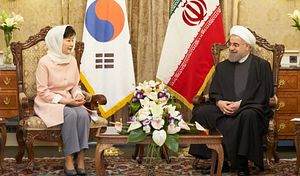Over the last decade, South Korea has been able to maintain a positive, although limited, working relationship with Iran despite tensions over the country’s nuclear program. Now, however, the Trump administration’s hardline policies toward Iran have essentially halted Korean trade with the country. The recent killing of General Qassem Soleimani has added another layer of uncertainty in Seoul about the impact of a prolonged standoff or even escalation between Tehran and Washington.
South Korea maintained relations with Iran, particularly in the economic realm, throughout previous periods of tension between Tehran and Washington. After the introduction of strict EU sanctions in 2012 and Iran’s removal from the Society for Worldwide Interbank Financial Telecommunication (SWIFT) network that facilitates international transactions, trade between the two countries dropped but did not halt, with South Korea still getting around 4 percent of its oil imports from Iran through 2015.
Because of their ongoing relationship, South Korea was among the countries that stood to benefit the most from the diplomatic breakthrough of the Joint Comprehensive Plan of Action (JCPOA) nuclear agreement that the Obama administration signed with Iran in 2015. In fact, Seoul was quick to prioritize building stronger ties with Iran. Former President Park Geun-hye visited Tehran in May 2016, marking the first summit meeting between a South Korean and Iranian leader since the countries established diplomatic relations in 1962. The two leaders agreed to work on a slew of economic projects spanning from infrastructure investment to cooperation on healthcare.
The Trump administration’s decision to withdraw from the JCPOA in May 2018 and reinstate sanctions threw a wrench in this growing Korea-Iran relationship. Although South Korea, along with China, India, Japan, Taiwan, Turkey, Italy, and Greece, received U.S. sanctions waivers and were allowed to continue trading with Iran after the withdrawal, uncertainty over Washington’s next move plagued relations in the region.
South Korea continued importing crude from Iran throughout 2018, with the country making up 4.8 percent of Korea’s total oil import volume in 2018. But after the United States decided not to renew sanctions waivers for countries including South Korea back in May 2019, Seoul cut off its Iranian oil imports. In the following months, South Korea turned to other sources, most notably the United States but also smaller sources like Kazakhstan, to make up for the loss of Iranian oil imports.
Because they have had several months to adjust to the loss of Iranian imports, South Korea may be slightly insulated from taking a direct economic hit from the U.S.-Iran dispute. But uncertainty is still shaking the world market, pushing up local gas prices in Korea and leading to concerns that escalation could create further ripple effects.
The rising tensions in the region have also raised economic concerns for South Korea outside of petroleum. Massive construction and shipping deals have taken a hit — because the sanctions waiver was not renewed, Korean construction firms have had to pull out of at least $2.5 billion in planned projects.
Korean exports of humanitarian goods such as food and medical supplies to Iran have also stagnated in recent months.
The potential impact of the Trump administration’s policies is not limited to the economic realm, of course. Prior to the U.S. drone strike that killed Soleimani in Iraq, the South Korean navy had been discussing a plan to expand the scope of an anti-piracy unit to include the Strait of Hormuz, a key shipping lane effectively controlled by Iran. Now, these discussions have reportedly been put on pause as South Korea assesses the situation in the region. Countries with large diplomatic and civilian populations in Iran and Iraq, including South Korea, have also reportedly been planning contingencies for how to protect their citizens in the region should tensions continue to rise.
Despite being able to maintain and even grow its relations with Iran in the last decade, South Korea is now caught between a rock and a hard place as the United States continues to ramp up hardline policies toward Tehran. As the region grapples with uncertainty about the effects of Soleimani’s death, Seoul will likely continue to try to work with the United States, its key ally, without completely discarding its hard-won relationship with Iran.

































